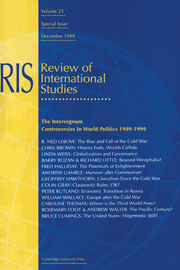Book contents
- Frontmatter
- Contents
- Acknowledgements
- Foreword
- Notes on contributors
- Introduction
- 1 The Rise and Fall of the Cold War in Comparative Perspective
- 2 History Ends, World Collide
- 3 Globalization and National Governance: Antinomies or Interdependence?
- 4 Beyond Westphalia?: Capitalism after the ‘Fall’
- 5 The Potentials of Enlightenment
- 6 Marxism after Communism
- 7 Liberalism Since the Cold War: An Enemy to Itself?
- 8 Clausewitz Rules, OK? The Future is the Past—with GPS
- 9 Mission Impossible? The IMF and the Failure of the Market Transition in Russia
- 10 Europe after the Cold War: Interstate Order or post-Sovereign Regional System?
- 11 Where is the Third World Now?
- 12 Whatever Happened to the Pacific Century?
- 13 Still the American Century
- Index
2 - History Ends, World Collide
Published online by Cambridge University Press: 05 November 2009
- Frontmatter
- Contents
- Acknowledgements
- Foreword
- Notes on contributors
- Introduction
- 1 The Rise and Fall of the Cold War in Comparative Perspective
- 2 History Ends, World Collide
- 3 Globalization and National Governance: Antinomies or Interdependence?
- 4 Beyond Westphalia?: Capitalism after the ‘Fall’
- 5 The Potentials of Enlightenment
- 6 Marxism after Communism
- 7 Liberalism Since the Cold War: An Enemy to Itself?
- 8 Clausewitz Rules, OK? The Future is the Past—with GPS
- 9 Mission Impossible? The IMF and the Failure of the Market Transition in Russia
- 10 Europe after the Cold War: Interstate Order or post-Sovereign Regional System?
- 11 Where is the Third World Now?
- 12 Whatever Happened to the Pacific Century?
- 13 Still the American Century
- Index
Summary
Introduction
The end of the Cold War was an event of great significance in human history, the consequences of which demand to be glossed in broad terms rather than reduced to a meaningless series of events. Neorealist writers on international relations would disagree; most such see the end of the Cold War in terms of the collapse of a bipolar balance of power system and its (temporary) replacement by the hegemony of the winning state, which in turn will be replaced by a new balance. There is obviously a story to be told here, they would argue, but not a new kind of story, nor a particularly momentous one. Such shifts in the distribution of power are a matter of business as usual for the international system. The end of the Cold War was a blip on the chart of modern history and analysts of international politics (educated in the latest techniques of quantitative and qualitative analysis in the social sciences) ought, from this perspective, to be unwilling to draw general conclusions on the basis of a few, albeit quite unusual, events. Such modesty is, as a rule, wise, but on this occasion it is misplaced. The Cold War was not simply a convenient shorthand for conflict between two superpowers, as the neorealists would have it. Rather it encompassed deep-seated divisions about the organization and content of political, economic and social life at all levels.
- Type
- Chapter
- Information
- Publisher: Cambridge University PressPrint publication year: 2000

